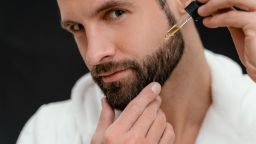As we age, our skin undergoes several changes that can lead to the appearance of fine lines, wrinkles, uneven skin tone, and loss of firmness. While there are countless skincare products promising to turn back the clock, few ingredients are as well-researched and as effective as retinol. A derivative of vitamin A, retinol has long been celebrated for its ability to address a variety of skin concerns, especially those associated with aging. If you’re looking to rejuvenate your skin and reduce the visible signs of aging, here’s everything you need to know about the benefits of retinol for aging skin.
- Reduces Fine Lines and Wrinkles
One of the most well-known benefits of retinol is its ability to reduce the appearance of fine lines and wrinkles. Retinol works by stimulating collagen production, a protein that gives your skin structure and elasticity. As collagen levels decrease with age, the skin begins to sag and wrinkle. By encouraging the production of collagen, retinol helps to firm the skin and smooth out fine lines, particularly around the eyes, mouth, and forehead.
How it works:
- Retinol speeds up the skin’s natural cell turnover process, which means it helps shed dead skin cells and promotes the generation of new, healthy skin cells.
- The increased collagen production strengthens the skin and fills in fine lines and wrinkles, making them less noticeable.
Tip: Consistent use of retinol over several weeks or months will yield the best results in reducing fine lines and wrinkles. You may not see immediate effects, but with time, the skin will appear smoother and more youthful.
- Improves Skin Texture and Tone
As we age, our skin’s texture can become uneven, with rough patches, age spots, or discoloration. Retinol can help improve the overall texture and tone of your skin by promoting faster cell turnover. This process removes dead skin cells more quickly, allowing new, fresh skin cells to surface. Over time, this leads to a smoother and more even complexion.
How it works:
- Retinol exfoliates the skin by speeding up the shedding of dead skin cells, helping to fade dark spots, hyperpigmentation, and other skin discolorations.
- It also enhances skin’s ability to absorb other skincare ingredients, making it an excellent addition to your anti-aging regimen.
Tip: If you have age spots or sun damage, retinol can help lighten these spots and prevent new ones from forming by encouraging the skin to produce healthier, more even skin cells.
- Stimulates Collagen Production
Collagen is the structural protein in the skin that keeps it firm, plump, and youthful. As we age, collagen production decreases, leading to sagging and the formation of wrinkles. Retinol is one of the most effective ingredients for stimulating collagen synthesis, which helps restore some of the skin’s lost volume and elasticity.
How it works:
- Retinol penetrates deep into the skin to stimulate the production of collagen and elastin, both of which are responsible for the skin’s firmness and elasticity.
- With regular use, retinol helps restore the skin’s structure, making it appear more lifted, firm, and youthful.
Tip: To maximize collagen production, combine retinol with other collagen-boosting ingredients, such as vitamin C, for a more comprehensive anti-aging skincare routine.
- Improves Skin Firmness
In addition to smoothing fine lines and improving skin texture, retinol can also help to increase skin firmness. As the skin’s collagen and elastin production is stimulated, the skin becomes more resilient and better able to snap back into place, reducing the appearance of sagging.
How it works:
- Retinol’s ability to promote collagen and elastin production results in tighter, more youthful-looking skin.
- It also helps to reduce the appearance of enlarged pores, which can contribute to the overall firmness of the skin’s surface.
Tip: For added firming effects, apply a retinol serum or cream to the jawline, neck, and décolletage area, where the skin is often prone to sagging and age-related changes.
- Fights Acne and Post-Acne Scarring
While retinol is primarily used for its anti-aging properties, it’s also highly effective in treating acne. Its ability to increase cell turnover means that it helps prevent pores from becoming clogged with dead skin cells, reducing the likelihood of breakouts. Additionally, retinol can help fade acne scars by promoting the growth of fresh skin cells.
How it works:
- Retinol works by encouraging the shedding of dead skin cells that could otherwise clog pores and lead to acne.
- It also accelerates healing, which helps fade post-acne marks and scars, leading to smoother skin over time.
Tip: If you’re prone to breakouts or have acne scars, consider using a retinol product that also contains other acne-fighting ingredients, such as salicylic acid or niacinamide, for a more comprehensive treatment.
- Enhances Skin Radiance
Regular use of retinol can help restore a healthy, glowing complexion by speeding up cell turnover. As older, dull skin cells are sloughed away, fresh, new skin cells emerge, leading to a more radiant and youthful-looking face.
How it works:
- Retinol exfoliates the skin and stimulates the production of fresh skin cells, giving your complexion a natural, healthy glow.
- It can also help even out skin tone, reducing the appearance of blotchiness and redness, which can make the skin look dull and lifeless.
Tip: For added radiance, pair retinol with a brightening vitamin C serum to brighten and even out your complexion.
- Reduces Sun Damage and Hyperpigmentation
Sun exposure is one of the leading causes of premature aging, resulting in sun spots, age spots, and uneven pigmentation. Retinol can help combat these signs of sun damage by accelerating the skin’s natural exfoliation process, which helps fade hyperpigmentation over time.
How it works:
- Retinol encourages the shedding of damaged skin cells, promoting the growth of new skin cells that are less likely to show signs of sun damage.
- It also helps to regulate melanin production, which can reduce dark spots and prevent new ones from forming.
Tip: While retinol is effective at fading sun spots, always use sunscreen during the day to protect your skin from further UV damage. Retinol can make your skin more sensitive to the sun, so SPF is essential.
- Increases Skin Hydration
Although retinol is known for its anti-aging benefits, it can sometimes cause dryness, especially when first introduced into your skincare routine. However, with consistent use, retinol can actually help increase hydration by stimulating the skin’s natural moisture production and improving its ability to retain water.
How it works:
- Retinol boosts the skin’s natural moisture barrier, helping to lock in hydration.
- Over time, this results in skin that feels plumper and more hydrated.
Tip: If you experience dryness or irritation when using retinol, start with a lower concentration and gradually increase usage. Pair retinol with a rich moisturizer to help combat any dryness or peeling.
Conclusion
Retinol is one of the most effective ingredients available for addressing the visible signs of aging. Whether you’re looking to reduce fine lines, improve skin texture, enhance firmness, or tackle sun damage, retinol can provide remarkable results. While it may take some time to see noticeable changes, the long-term benefits are worth the effort. To get the most out of your retinol, incorporate it into your nighttime routine, start slowly to build your skin’s tolerance, and always apply sunscreen during the day to protect your skin. With consistent use, retinol can help you achieve smoother, more youthful, and radiant skin.





